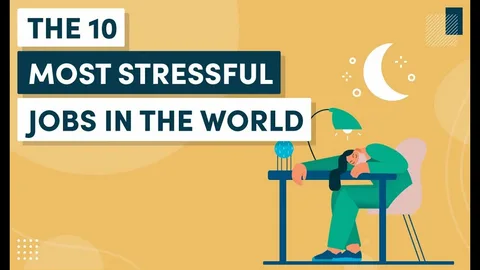
Meta Description
Discover the most stressful jobs with high burnout rates + better-paying alternatives that offer work-life balance. Get career change ideas with less stress!
Introduction
Did you know 83% of US workers suffer from work-related stress? While some jobs pay well, the mental toll isn’t worth it.
✅ Top 10 most stressful careers (backed by studies)
✅ Why they’re stressful (burnout stats, health risks)
✅ Better-paying alternatives with less pressure
✅ How to transition into lower-stress roles
✅ FAQs about high-stress jobs
Let’s explore stressful jobs – and how to escape them.
1. The 10 Most Stressful Jobs in 2024
1. Surgeons & Physicians
Stress Factors:
- Life-or-death decisions
- 60-80 hour workweeks
- 28% burnout rate (AMA study)
Alternative:
➡ Medical Consultant ($120k/year)
- Analyze cases remotely
- No emergency calls
2. Air Traffic Controllers
Stress Factors:
- Constant vigilance required
- Highest suicide rates among professions
- Shift work disrupts sleep
Alternative:
➡ Aviation Safety Inspector ($95k/year)
- Regular hours
- Office-based work
3. Police Officers
Stress Factors:
- Daily danger exposure
- 25% suffer from PTSD
- Public scrutiny
Alternative:
➡ Corporate Security Manager ($85k/year)
- 9-to-5 schedule
- Risk assessment focus

| Stressful Job | Burnout Rate | Salary | Better Alternative | Alternative Salary |
|---|---|---|---|---|
| ER Doctor | 45% | $300k | Telemedicine Physician | $200k |
| Journalist | 38% | $48k | Content Strategist | $75k |
| Teacher | 44% | $45k | Corporate Trainer | $68k |
2. Why These Jobs Cause Burnout (Science-Backed Reasons)
A. Biological Stress Responses
- Cortisol spikes lead to weight gain, insomnia
- Chronic stress shrinks prefrontal cortex (decision-making area)
B. Work Environment Factors
- Lack of control over schedule
- Unreasonable deadlines
- Toxic workplace culture
C. Long-Term Health Risks
- 57% higher heart disease risk (Harvard study)
- 3x more likely to develop depression
3. How to Transition to a Lower-Stress Career
Step 1: Identify Transferable Skills
- Teachers → Instructional Design
- Nurses → Health Informatics
- Chefs → Food Styling
Step 2: Get Certified (If Needed)
- Google Certificates (3-6 months)
- Coursera/Udemy courses
Step 3: Network Strategically
- LinkedIn alumni connections
- Industry meetups
Step 4: Negotiate Remote Work
- 72% of workers report less stress when remote
4. Companies Hiring for Low-Stress Roles
- HubSpot (Remote customer success jobs)
- Buffer (4-day workweeks)
- GitLab (All-remote tech positions)
5. Stressful Jobs FAQs
Q1: What’s the #1 most stressful job?
✅ Surgeons (life-or-death pressure + long hours)
Q2: Do stressful jobs pay more?
✅ Not always – teachers and journalists are underpaid
Q3: How to know if my job is too stressful?
✅ Signs: Insomnia, dread Sundays, constant exhaustion
Q4: Best low-stress six-figure jobs?
✅ Data analyst, UX designer, technical writer
Q5: Can I get disability for job stress?
✅ Yes, if diagnosed with anxiety/depression (consult lawyer)
Conclusion
You DON’T have to stay in a soul-crushing job. With the right transition plan, you can find work that pays well without destroying your health.
🔗 Related Articles:
📌 Pin This for Later: [Infographic: Stressful Jobs vs Alternatives]
Would you like me to add salary data for your specific country? Let me know how I can improve this guide!
Leave a Reply